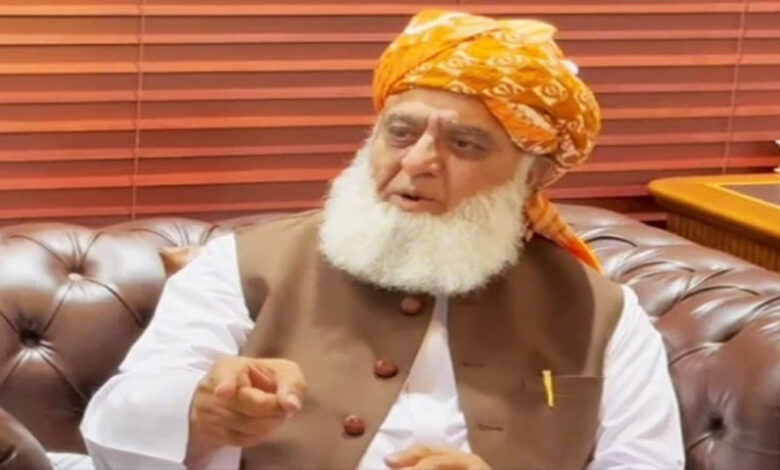Maulana Fazlur Rehman Sets Deadline for Government on Religious Schools Bill, Threatens Protests

Islamabad, Pakistan:Maulana Fazlur Rehman, the leader of the Jamiat Ulema-e-Islam-Fazl (JUI-F), has issued a one-day ultimatum to the government for signing the Religious Schools Registration Bill (Dini Madaris Bill). He warned that if the bill is not approved immediately, the government will face a widespread anti-government movement, and the JUI-F may even march towards Islamabad.
The bill, which aims to regulate and register religious schools (madrasas) across Pakistan, had been passed by both the Senate and the National Assembly before being sent to the President. However, it was returned by the President with eight objections, delaying its approval.
JUI-F leader Senator Kamran Murtaza spoke exclusively to V News, emphasizing that while the bill was presented by the government, it was the party’s demand for stricter regulation of madrasas. He explained that before the government introduced the bill, it had gone through the cabinet, which approved it, followed by both the National Assembly and Senate’s approval. However, the President raised concerns and sent it back.
**Key Points of the Bill:**
– **Registration of Madrasas:** The bill proposes that all madrasas, particularly those without official records, be registered under the Societies Registration (Amendment) Act. This would allow the government to track the location and operational status of religious schools.
– **Madrasas’ Autonomy:** The bill aims to preserve the autonomy of madrasas, ensuring that their curriculum and administration remain independent, while the government will have limited control. This balance would allow for transparency and accountability without interfering with their educational activities.
– **Audit and Curriculum Oversight:** Once the bill is passed, madrasas will be audited, and their curricula will be scrutinized to prevent the promotion of hate speech, extremism, or sectarianism. The bill will ensure that religious schools comply with national education standards, while still allowing them to maintain their unique identity.
Senator Kamran Murtaza further noted that the JUI-F’s stance is not to confront the government but to seek a solution that protects the independence of madrasas. “We do not want a direct clash with the government, but we believe that religious schools should be part of the formal system and under the rule of law,” he stated.
**Government Resistance:**
Despite the JUI-F’s efforts to push the bill through, there has been resistance from the government. Murtaza claimed that the government was reluctant to grant madrasas official registration, fearing that it could give them more authority. However, he clarified that the JUI-F sees registration as beneficial for the state, as it would bring madrasas into the national framework, helping them contribute to society in a more organized manner.
The **Federation of Madaris Arabia Pakistan**, the body representing religious schools across the country, also called on the government to approve the bill without further delay. They expressed concerns over the government’s actions to undermine the autonomy of madrasas, warning that any moves to curtail their freedom would not be acceptable.
**Political Implications:**
Maulana Fazlur Rehman and his party have made it clear that they will continue to push for the bill’s approval. The JUI-F’s leadership has also indicated that if the bill is not passed soon, they may escalate their actions, including a possible march to Islamabad.
“Islamabad is a possibility if our demands are not met. We will take all necessary steps to ensure that our rights and the rights of religious schools are protected,” said Maulana Fazlur Rehman.
With the political situation intensifying, the fate of the Religious Schools Registration Bill will have significant implications for the relationship between the religious community and the government, as well as the future of education in Pakistan.






